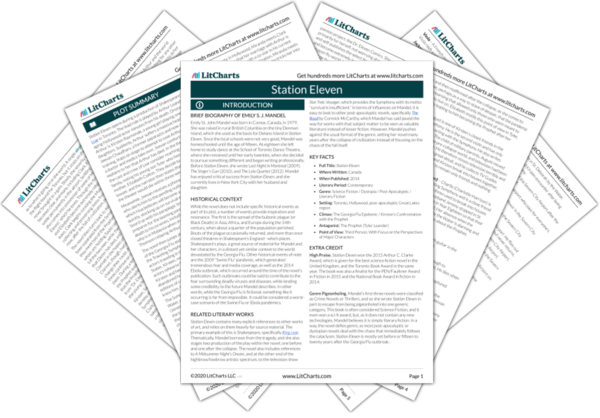After the collapse, airplanes are a symbol of civilization. They represent the connectivity of the technologically advanced, pre-collapse modern world. In the immediately aftermath, people would look towards the sky, hopeful of seeing planes flying overhead. Such a sight would signify that somewhere, planes still took off, and civilization as it was once known still existed. The connectivity and ease of travel provided by planes, though, is also what enabled the Georgia Flu to spread so efficiently throughout the planet. Planes, then, also symbolize the ironically self-defeating nature of human civilization.
In the Severn City Airport, airplanes still symbolize civilization and its collapse, existing now only as repurposed homes or dark places for teenagers to sneak off to. But during and immediately following the collapse they also take on a symbolism of hope and despair. Just as the full scope of the Georgia Flu is being realized, an airplane lands at the Severn City Airport, but it is forced to remain out on the tarmac. Throughout his life, Clark tries to avoid thinking about what the decision to keep the infected plane out of the airport must have been like, or what it meant for those on the plane during the last torturous hours of their lives. Mostly untouched for years after the collapse, this solitary plane represents death, dread, and the difficult decisions made to keep survivors alive. The Severn City Airport also provides the unique opportunity for pilots to try to reconnect with distant family after the collapse, as a few of them take planes in hope of finding loved ones. These rescue missions are among the last flights of human civilization, and though they leave in hope, none of them ever return to Severn City.
Finally, airplanes take on an intense religious symbolism within the novel. As the Prophet, Tyler combines his name with the cross, inserting an extra line into a lowercase t. This then becomes a symbol of his cult, which is even used as a brand or mark on human faces—andAugust recognizes the pseudo-cross as a makeshift symbol for an airplane.
Airplanes Quotes in Station Eleven
Chapter 6 Quotes
No more flight. No more towns glimpsed from the sky through airplane windows, points of glimmering light; no more looking down from thirty thousand feet and imagining the lives lit up by those lights at that moment. No more airplanes, no more requests to put your tray table in its upright and locked position—but no, this wasn't true, there were still airplanes here and there. They stood dormant on runways and in hangars. They collected snow on their wings. In the cold months, they were ideal for food storage. In summer the ones near orchards were filled with trays of fruit that dehydrated in the heat. Teenagers snuck into them to have sex. Rust blossomed and streaked.
Chapter 30 Quotes
On silent afternoons in his brother's apartment, Jeevan found himself thinking about how human the city is, how human everything is. We bemoaned the impersonality of the modern world, but that was a lie, it seemed to him; it had never been impersonal at all. There had always been a massive delicate infrastructure of people, all of them working unnoticed around us, and when people stop going to work, the entire operation grinds to a halt.












